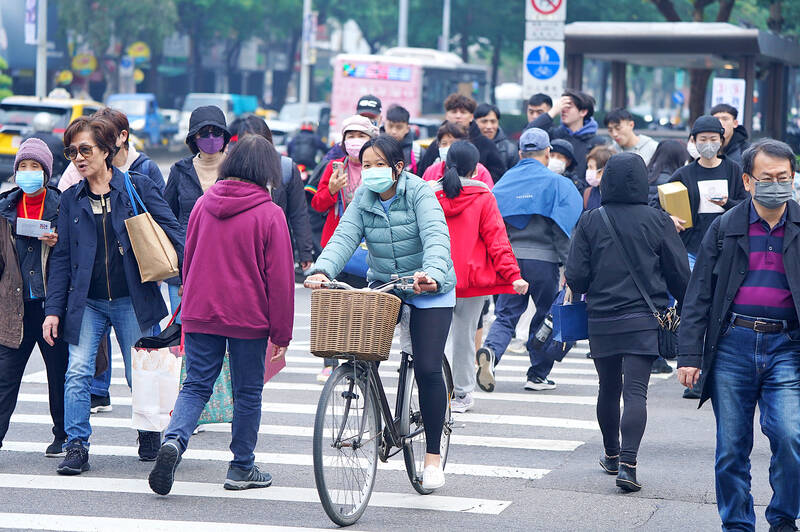Taiwan’s population could fall below 15 million by 2070, suggesting that issues with the nation’s aging population and declining birthrate would not improve, the National Development Council (NDC) said in its latest population projection released yesterday.
The council publishes its population projections every two years using household registration data, with this year being the first that it included a survey of experts to help model more accurate fertility trends.
Taiwan’s aging population has already started to affect all aspects of society, the council said, adding that it would continue to collaborate with ministries to address demographic issues.

Photo: CNA
According to the latest projections, if each woman only has one child over the course of her lifetime, the short-term projections would remain in line with estimates.
Long-term, the consequences of an aging society would become increasingly severe, it said.
Taiwan is not alone in this.
About one-quarter of countries’ populations are expected to decline this year, including Taiwan, China, Japan and South Korea, the council said.
Taiwan’s population could drop from 23.4 million this year to 14.97 million by 2070, a decline of 8.4 million people, it said.
Broken down by age group, there is a projected decline of 1.71 million in the zero-to-14 age group, a decline of 9.2 million in the 15-to-64 working-age population and an increase of 2.48 million for those aged 65 or older, it said.
By next year, Taiwan is expected to be a “super-aged society,” meaning that 20 percent of the population is 65 or older, it added.
In March, the NDC announced that six of Taiwan’s 22 administrative regions were already “super-aged.”
As of this year, 40 countries and regions globally fit the criteria of “super-aged societies,” including Japan, Germany and France, the NDC said.
Taiwan’s demographic dividend — the economic benefit of a large population of workers relative to dependents, such as children or elderly family members — is projected to end by 2028, when the proportion of people in the working-age category is expected to drop below two-thirds of the population, it said.
Due to the combination of increased life expectancies and declining birthrates, the share of the population that is 65 or older is expected to rise from 19.2 percent to 46.5 percent in 2070, while the median age is to increase to 62.4 from 45.1, it said.
Additionally, the ratio of 3.6 working-age people to each elderly person would decline to one-to-one, it said.

AT RISK: The council reiterated that people should seriously consider the necessity of visiting China, after Beijing passed 22 guidelines to punish ‘die-hard’ separatists The Mainland Affairs Council (MAC) has since Jan. 1 last year received 65 petitions regarding Taiwanese who were interrogated or detained in China, MAC Minister Chiu Chui-cheng (邱垂正) said yesterday. Fifty-two either went missing or had their personal freedoms restricted, with some put in criminal detention, while 13 were interrogated and temporarily detained, he said in a radio interview. On June 21 last year, China announced 22 guidelines to punish “die-hard Taiwanese independence separatists,” allowing Chinese courts to try people in absentia. The guidelines are uncivilized and inhumane, allowing Beijing to seize assets and issue the death penalty, with no regard for potential

STILL COMMITTED: The US opposes any forced change to the ‘status quo’ in the Strait, but also does not seek conflict, US Secretary of State Marco Rubio said US President Donald Trump’s administration released US$5.3 billion in previously frozen foreign aid, including US$870 million in security exemptions for programs in Taiwan, a list of exemptions reviewed by Reuters showed. Trump ordered a 90-day pause on foreign aid shortly after taking office on Jan. 20, halting funding for everything from programs that fight starvation and deadly diseases to providing shelters for millions of displaced people across the globe. US Secretary of State Marco Rubio, who has said that all foreign assistance must align with Trump’s “America First” priorities, issued waivers late last month on military aid to Israel and Egypt, the

‘UNITED FRONT’ FRONTS: Barring contact with Huaqiao and Jinan universities is needed to stop China targeting Taiwanese students, the education minister said Taiwan has blacklisted two Chinese universities from conducting academic exchange programs in the nation after reports that the institutes are arms of Beijing’s United Front Work Department, Minister of Education Cheng Ying-yao (鄭英耀) said in an exclusive interview with the Chinese-language Liberty Times (the Taipei Times’ sister paper) published yesterday. China’s Huaqiao University in Xiamen and Quanzhou, as well as Jinan University in Guangzhou, which have 600 and 1,500 Taiwanese on their rolls respectively, are under direct control of the Chinese government’s political warfare branch, Cheng said, citing reports by national security officials. A comprehensive ban on Taiwanese institutions collaborating or

France’s nuclear-powered aircraft carrier and accompanying warships were in the Philippines yesterday after holding combat drills with Philippine forces in the disputed South China Sea in a show of firepower that would likely antagonize China. The Charles de Gaulle on Friday docked at Subic Bay, a former US naval base northwest of Manila, for a break after more than two months of deployment in the Indo-Pacific region. The French carrier engaged with security allies for contingency readiness and to promote regional security, including with Philippine forces, navy ships and fighter jets. They held anti-submarine warfare drills and aerial combat training on Friday in